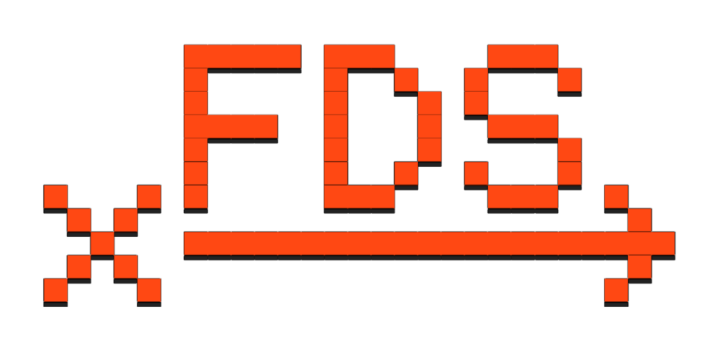Home


Source Code: github.com/pbdtools/xfds
Documentation: xfds.pbd.tools

Do you have FDS installed on your machine? Do you know where the FDS executable is located? Do you know what version it is? Maybe you have multiple versions of FDS on your machine, but do you know which one do you use?
Perhaps you generate a large number of spreadsheets to help you generate fire models. Are you tired of copying and pasting data all over the place? Do you spend a lot of time debugging your FDS code because that fire is just a bit off it's mark? 🤯
Designed to save you time, xFDS is meant to help generate and manage your fire models. Sound too good to be true? Learn more at xfds.pbd.tools! 🤓
Not quite convinced it's worth it? Watch the presentation from FEMTC 2022 or let us tell you more...
Features¶
Generate Parametric Analyses¶
Fire models can often require mesh sensitivity studies, different fire sizes, adjusting exhaust rates, or messing with a number of differnt parameters. With the power of the Jinja templating system, xFDS can help generate and fine tune a variety of models from a single .fds file!
Specify Resolution, not IJK¶
Let xFDS calculate the number of cells so you don't have to. By setting variables in your FDS file or configuration file, you can use them to perform calculations. Anything between double curly braces {{ and }} is evaluated as Python code.
{% set xmax, ymax, zmax = 5, 4, 3 %}
{% set res = 0.2 %}
&MESH XB=0, {{ xmax }}, 0, {{ ymax }}, 0, {{ zmax }},
IJK={{ xmax // res }}, {{ ymax // res }}, {{ zmax // res }}/
Will translate to:
&MESH XB= 0, 5, 0, 4, 0, 3,
IJK= 25, 20, 15/
Want to run a finer mesh? Just change res to 0.1 and get
&MESH XB= 0, 5, 0, 4, 0, 3,
IJK= 50, 40, 30/
Feel like that template is a bit verbose? xFDS has some convience template filters to make your life easier.
{% set bounds = 0, 5, 0, 4, 0, 3 %}
&MESH XB={{ bounds|xb }}, IJK={{ bounds|ijk(res) }}
Don't think, KNOW your HRRPUA is correct¶
It can be tricky to tell if the Heat Release Rate Per Unit Area (HRRPUA) parameter is correct. Are you sure the area used for the burner will give you the correct heat release rate (HRR)? With xFDS, you can define your HRR and Area then let xFDS do the calculations for you! 🚀
{% set hrr = 1000 %}
{% set area = 1.5 %}
{% set offset = (area ** 0.5) / 2 %}
&SURF ID='BURNER', COLOR='RED', HRRPUA={{ (hrr / area)|round(2) }}/
&VENT XB={{ (-offset, offset, -offset, offset, 0.0, 0.0)|xb }}, SURF_ID='BURNER'/
Go ahead and try out this burner and see if xFDS got it right. 😉
&MESH XB=-2, 2, -2, 2, 0, 4, IJK=60, 60, 60/
&TIME T_END=10/
&REAC FUEL='PROPANE'/
---
&SURF ID='BURNER', COLOR='RED', HRRPUA=666.67/
&VENT XB= -0.612, 0.612, -0.612, 0.612, 0.000, 0.000, SURF_ID='BURNER'/
---
&VENT MB='XMIN', SURF_ID='OPEN'/
&VENT MB='XMAX', SURF_ID='OPEN'/
&VENT MB='YMIN', SURF_ID='OPEN'/
&VENT MB='YMAX', SURF_ID='OPEN'/
Use loops to create an array of devices¶
Tired of generating a bunch of items? Use for loops to get it done faster!
Here, xFDS creates 8 thermocouples evenly spaced between 1 ft and 8 ft. Yep, you can specify things in whatever unit you want thanks to the convert filter
{% set n_thcps, bottom, top = 8, 1|convert('ft', 'm'), 8|convert('ft', 'm') %}
{% for z in n_thcps|linspace(bottom, top) %}
&DEVC ID="THCP_{{ loop.index }}" QUANTITY='THERMOCOUPLE', XYZ={{ (0, 0, z)|xyz }}/
{% endfor %}
Will render to the following code.
&DEVC ID="THCP_1" QUANTITY='THERMOCOUPLE', XYZ= 0.000, 0.000, 0.305/
&DEVC ID="THCP_2" QUANTITY='THERMOCOUPLE', XYZ= 0.000, 0.000, 0.610/
&DEVC ID="THCP_3" QUANTITY='THERMOCOUPLE', XYZ= 0.000, 0.000, 0.914/
&DEVC ID="THCP_4" QUANTITY='THERMOCOUPLE', XYZ= 0.000, 0.000, 1.219/
&DEVC ID="THCP_5" QUANTITY='THERMOCOUPLE', XYZ= 0.000, 0.000, 1.524/
&DEVC ID="THCP_6" QUANTITY='THERMOCOUPLE', XYZ= 0.000, 0.000, 1.829/
&DEVC ID="THCP_7" QUANTITY='THERMOCOUPLE', XYZ= 0.000, 0.000, 2.134/
&DEVC ID="THCP_8" QUANTITY='THERMOCOUPLE', XYZ= 0.000, 0.000, 2.438/
Manage FDS Runs¶
Auto-detect FDS file in directory¶
If you're in a directory containing an FDS file, xFDS will find the FDS file without you specifying it. All you need to do is say xfds run!
Latest version of FDS always available.¶
xFDS will always default to the latest version thanks to how the Docker images are created. You can always use an older version of FDS if needed and xFDS makes it easy to work with any version of FDS you need.
Always know what FDS version you're using.¶
xFDS will inject the FDS version into the Docker container name so there's no question what version of FDS is running.
Runs in Background¶
Fire and forget. xFDS will run your model in a Docker container and free up your terminal for you to keep working.





